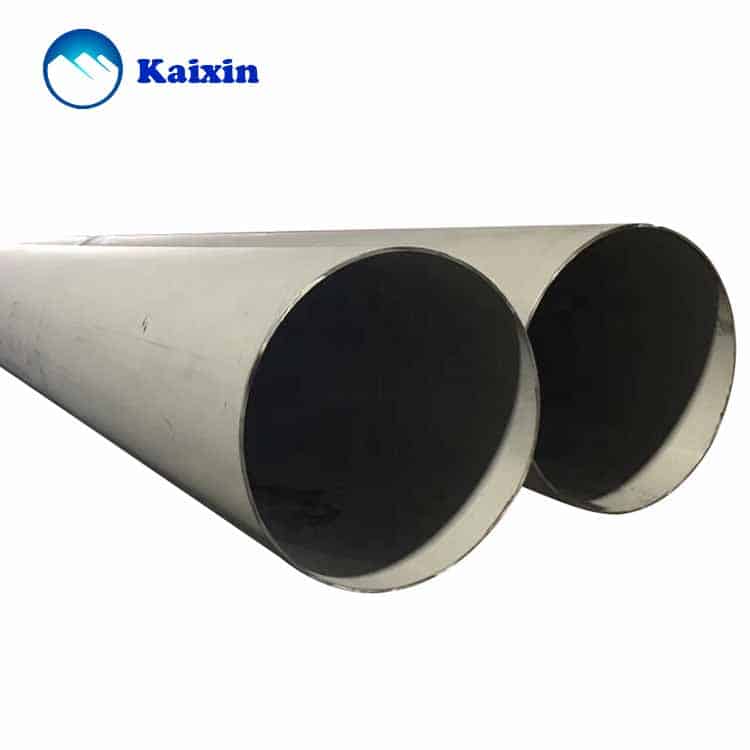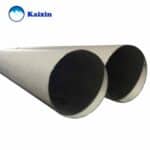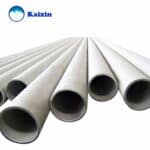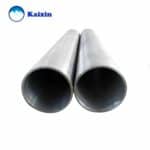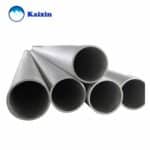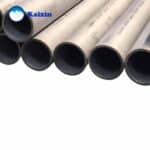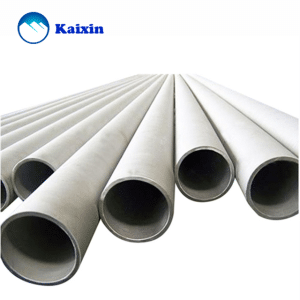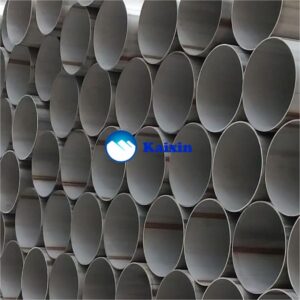Rohr aus rostfreiem Stahl refers to a long cylindrical-shaped metal tube made of top-quality stainless steel. The stainless steel material offers excellent corrosion resistance and durability, making it an ideal choice for a wide range of applications. These tubes come in different shapes, sizes, and grades to meet the diverse needs of customers. Some popular types of stainless steel tubes include seamless stainless steel tubeS, welded stainless steel tubes, round stainless steel tubes, rectangular stainless steel tubes, and square Rohr aus rostfreiem StahlS. They find applications in industries such as oil and gas, chemische Verarbeitung, food processing, aerospace, automotive, and many more.
Stainless steel tube Specification
Stainless steel tube specifications vary depending on the intended use and application. Some common specifications include:
- ASTM A269: This specification covers seamless and welded austenitic stainless steel tubes for general use, such as in chemical and petrochemical processing, pharmaceutical production, and food and beverage processing.
- ASTM A312: This specification covers seamless, geschweißt, and heavily cold worked austenitic stainless steel pipes for high-temperature and general corrosive service, such as in oil and gas production, pulp and paper processing, and power generation.
- ASTM A554: This specification covers welded stainless steel mechanical tubing for ornamental, structural, and decorative applications, such as in handrails, balustrades, and architectural features.
- ASTM A270: This specification covers seamless and welded austenitic stainless steel sanitary tubing intended for use in the dairy, Essen, and beverage industries.
Other important factors to consider when choosing stainless steel tube specifications include material grade, size, Wandstärke, and surface finish. Common material grades include 304/304L, 316/316L, and duplex stainless steels such as 2205. Sizes typically range from 1/8 inch to 36 inches in diameter, with wall thicknesses ranging from 0.5mm to 50mm or more. Surface finishes may include annealed, pickled and passivated, polished, or buffed.
What is the details of our A213 Stainless Steel Seamless Pipe Price ?
| Name | A213 Nahtloses Edelstahlrohr Preis |
| Standard | ASTM, GB, ER, AUS, IN, AISI |
| Material Grade | TP304 TP304L TP316 TP316L TP347 TP347H TP321 TP321H TP310 TP310S |
| TP410 TP410S TP403 | |
| S31803/S32205 S32750 S32760 | |
| Outer Diameter | Seamless Pipe: 13mm – 609mm |
| Dicke | Seamless Pipe: 1.65mm – 12.7mm |
| Länge | 5.8-6.1 m or as customers‘ request |
| Tolerance | Acording to the Standard. |
| Surface | Pickling, sand blast |
| Prüfen | UT, ET, HT, RT,ect, and others according to the standard,or as the requests of the customers |
| Zertifikat | ISO9001-2008,ASME, PED |
| Delivery Time | 7-30Days, Depends on quantity |
Stainless steel tube Mechanische Eigenschaften
Stainless steel is known for its exceptional mechanical properties, making it a highly sought-after material for various industrial applications. These properties include:
1. Strength: Stainless steel is known for its high strength, making it highly resistant to deformation and fracture under stress.
2. Härte: Stainless steel is a hard material that can withstand wear and tear, making it highly durable and long-lasting.
3. Ductility: Stainless steel has good ductility, meaning it can be easily bent, twisted or stretched without breaking.
4. Resistance to corrosion: Stainless steel is highly resistant to corrosion, making it ideal for use in harsh environments that are acidic or contain corrosive materials.
5. Thermal conductivity: Stainless steel has a high level of thermal conductivity, which makes it ideal for use in applications that require heat transfer such as heat exchangers.
6. Magnetic properties: Some grades of stainless steel are magnetic, which makes it ideal for use in motors and electrical applications.
Overall, stainless steel’s mechanical properties make it a highly versatile material that can be used in a wide range of applications.
| SS GRADE | HEAT TREATMENT | TEMPERURE F (C) MINIMUM | HARDNESS | |
|---|---|---|---|---|
| BRINELL | ROCKWELL | |||
| TP304 | Lösung | 1900 (1040) | 192HBW/ 200HV | 90HRB |
| TP304L | Lösung | 1900 (1040) | 192HBW/ 200HV | 90HRB |
| TP316 | Lösung | 1900(1040) | 192HBW/ 200HV | 90HRB |
| TP316L | Lösung | 1900(1040) | 192HBW/ 200HV | 90HRB |
| TP321 | Lösung | 1900(1040) F | 192HBW/ 200HV | 90HRB |
| TP347 | Lösung | 1900(1040) | 192HBW/ 200HV | 90HRB |
Stainless steel tube Chemical composition
it chemical composition of Rohr aus rostfreiem Stahls varies depending on the grade of the stainless steel used. Jedoch, the most common grades of stainless steel used for tubes are 304 Und 316.
The chemical composition of 304 stainless steel is:
– Kohlenstoff: 0.08%
– Chrom: 18-20%
– Nickel: 8-10.5%
– Mangan: 2%
– Silizium: 1%
– Phosphor: 0.045%
– Schwefel: 0.03%
The chemical composition of 316 stainless steel is:
– Kohlenstoff: 0.08%
– Chrom: 16-18%
– Nickel: 10-14%
– Molybdän: 2-3%
– Mangan: 2%
– Silizium: 1%
– Phosphor: 0.045%
– Schwefel: 0.03%
Other elements may also be added to stainless steel tubes to improve their corrosion resistance, strength or other properties. These elements may include titanium, copper, nitrogen or niobium.
| SS GRADE | CHEMICAL COMPOSITION % MAXIMUM | ||||||||||
|---|---|---|---|---|---|---|---|---|---|---|---|
| C | MN | P | S | SI | CR | NI | MO | N B | Hinweis: | TI | |
| TP304 | 0.08 | 2.00 | 0.045 | 0.030 | 1.00 | 18.0-20.0 | 8.0-11.0 | — | — | — | — |
| TP304L | 0.035 | 2.00 | 0.045 | 0.030 | 1.00 | 18.0-20.0 | 8.0-12.0 | — | — | — | — |
| TP316 | 0.08 | 2.00 | 0.045 | 0.030 | 1.00 | 16.0-18.0 | 10.0-14.0 | 2.00-3.00 | — | — | — |
| TP316L | 0.035 D | 2.00 | 0.045 | 0.030 | 1.00 | 16.0-18.0 | 10.0-15.0 | 2.00-3.00 | — | — | — |
| TP321 | 0.08 | 2.00 | 0.045 | 0.030 | 1.00 | 17.0-19.0 | 9.0-12.0 | — | — | — | 5C -0.70 |
| TP347 | 0.08 | 2.00 | 0.045 | 0.030 | 1.00 | 17.0-19.0 | 9.0-12.0 | 10C -1.10 | — | ||
 Edelstahlrohrlieferant Wenzhou Kaixin China
Edelstahlrohrlieferant Wenzhou Kaixin China

